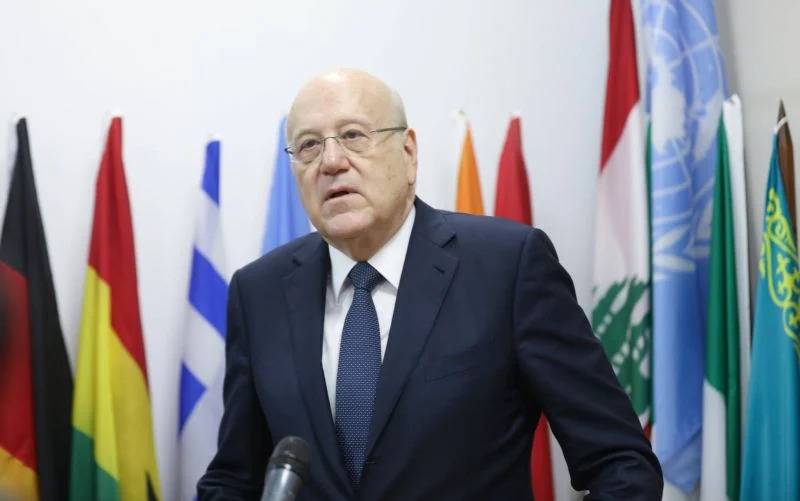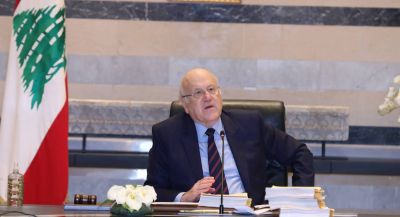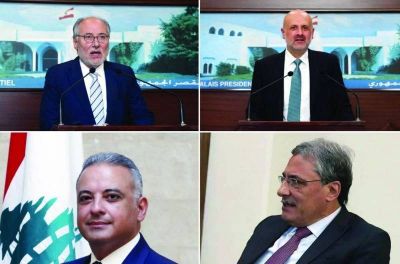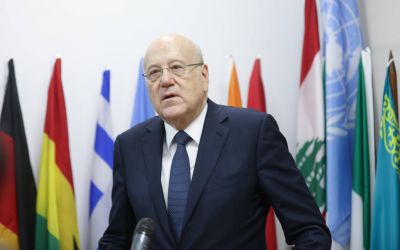
Caretaker Prime Minister Najib Mikati during a press briefing at UNIFIL headquarters in Naqoura on Dec. 16, after the attack on a convoy of peacekeepers in southern Lebanon. (Credit: Dalati and Nohra)
Caretaker Prime Minister Najib Mikati clearly wants to avoid a new political dilemma, which is why he is avoiding convening a new cabinet session meeting without the approval of all his government ministers, including those from the Free Patriotic Movement.
In the FPM’s eyes, calling a cabinet meeting is an encroachment on the prerogatives of the president.
Mikati also promised Maronite Patriarch Bechara al-Rai not to take any step in that direction. Yet he is not ruling out any possibility, stressing his prerogatives as premier responsible for the management of the country during a presidential vacancy.
Nearly two weeks after the controversial Dec. 5 cabinet session, several local media outlets have been reporting about another possible session during the holiday season in a bid to decide on issues related to military promotions.
For the moment, Mikati has not yet taken action. At this stage, he says he prefers to convene his cabinet only to discuss “necessary and urgent matters.”
“I do not want to challenge anyone,” Mikati told L’Orient-Le Jour. “I do not see any urgent issue that requires a cabinet meeting.”
What about the army promotions? The premier places the ball back in the cabinet’s court, including the FPM ministers.
“If they agree on the need and urgency to decide this issue, I have no problem convening a cabinet meeting,” he said.
For him, the priority remains the preservation of the prime minister’s prerogatives, namely setting up the agenda for ministerial meetings.
“It is true that I do not want to provoke anyone,” Mikati said. “But it is important for me to preserve my right to hold a cabinet session and to set its agenda.”
This is a clear response to the caretaker Justice Minister, Henri Khoury (close to the FPM), who believes that it is up to the president, in consultation with the premier, to put forth the agenda for any ministerial meeting.
Khoury defends the argument that the caretaker government should not meet during a presidential vacancy, deeming such a move “unconstitutional,” a position that he strongly upheld during a meeting of minister-judges last week.
The meeting, which was aimed at finding a compromise for any future cabinet session, ended in a bitter failure.
FPM on the rampage
“Henri Khoury has only expressed a position of principle, one that we uphold,” Eddy Maalouf, former FPM MP for Metn, told L’Orient-Le Jour.
Maaoulf’s remarks reflected the FPM position communicated in the statement issued Dec. 21 by the party political committee, the day after its weekly meeting at the FPM headquarters in Sin al-Fil.
The party rejected the “unconstitutional and illegitimate [Dec. 5] cabinet session that was in direct conflict with the National Pact.”
“We shall consider that the session did not take place and we call for rectifying this error by issuing the decisions [that were taken in the Dec. 5 cabinet session] as per decree-law that should be countersigned by all ministers in accordance with Article 62 of the Constitution,” which transfers the president’s prerogatives to cabinet, the statement read.
The FPM also denounced what it described as “an attempt to undermine an essential component of the equation and to take the country back to the pre-2005 period, when true representativeness [of Christians] was confiscated.”
Mikati’s response was immediate.
In a statement issued by his press office that same day, the caretaker prime minister announced that he had asked caretaker Defense Minister Maurice Slim (close to former president Michel Aoun) to sign a decree granting social aid to military institutions, as approved by the cabinet on Dec. 5.
But what about Hezbollah? In this tough tug-of-war between Mikati and FPM leader Gebran Bassil, the party finds itself, once more, in a critical position.
Hezbollah wants to give the impression that it is watching over the proper functioning of the state’s institutions, while the presidential election is blocked, pending a broader agreement the party has been advocating.
The party also has no interest in further souring relations with its main Christian ally, the FPM — relations between the two almost broke down for the first time since the signing of their 2006 Mar Mikhael agreement, in the wake of the Dec. 5 cabinet session.
But while Hezbollah assured Mikati that the last session would have political cover, the party has not yet said its last word about any future cabinet meetings.
“As long as there is no official convocation, we can’t say anything,” a party official told L'Orient-Le Jour on condition of anonymity.
This article was originally published in French in L'Orient-Le Jour. Translation by Sahar Ghoussoub.


